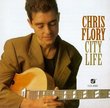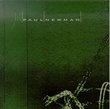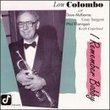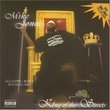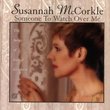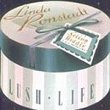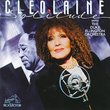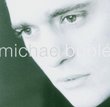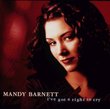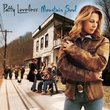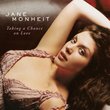| All Artists: Susannah Mccorkle Title: Let's Face the Music: The Songs of Irving Berlin Members Wishing: 1 Total Copies: 0 Label: Concord Records Release Date: 5/27/1997 Genres: Jazz, Pop, Broadway & Vocalists Styles: Traditional Jazz & Ragtime, Vocal Jazz, Easy Listening, Oldies, Vocal Pop, Traditional Vocal Pop Number of Discs: 1 SwapaCD Credits: 1 UPC: 013431475927 |
Search - Susannah Mccorkle :: Let's Face the Music: The Songs of Irving Berlin
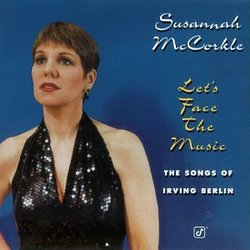 | Susannah Mccorkle Let's Face the Music: The Songs of Irving Berlin Genres: Jazz, Pop, Broadway & Vocalists
Susannah McCorkle does not have a big, overpowering voice; she has built her reputation as a jazz and cabaret singer on the sheer sensuality of her purr. In other words, she's a musical descendant of Billie Holiday, not El... more » |
Larger Image |
CD DetailsSynopsis
Amazon.com Susannah McCorkle does not have a big, overpowering voice; she has built her reputation as a jazz and cabaret singer on the sheer sensuality of her purr. In other words, she's a musical descendant of Billie Holiday, not Ella Fitzgerald. When she understates material to give it a romantic intimacy, she's as pleasurable a vocalist as her field knows. When she tries to reach for a brassy climax to a show-stopper Broadway tune, she inevitably falls short. Fortunately, there's more understatement than overstatement on Let's Face the Music: The Songs of Irving Berlin. Many of the album's 14 Berlin compositions are associated with Fred Astaire, and McCorkle displays a rhythmic dexterity reminiscent of the old hoofer--who also compensated for a lack of vocal power with a seductive timbre. McCorkle is backed by solo piano, solo guitar, piano trio, saxophone quintet, and jazz octet, and the different settings give the project a welcome variety. The musicians are top-notch; Phil Woods bassist Steve Gilmore provides the supple pulse, and saxophonists Jerry Dodgion and Chris Potter supply solos as arresting as the vocals. McCorkle shows her imagination in reworking "Cheek to Cheek" as a bossa nova, and her good sense in resisting the temptation to belt out "Let's Face the Music and Dance;" instead she turns it into an invitation to a slower, sexier turn on the dance floor. --Geoffrey Himes Similar CDs
Similarly Requested CDs
|
CD ReviewsBetter Than Most Berlin Steve Emerine | Tucson, AZ United States | 02/08/2001 (5 out of 5 stars) "Virtually every jazz and pop singer has recorded some Irving Berlin tunes, and many have done entire albums of them. Then Susannah McCorkle comes along with pianist Allen Farnham and some small groups to do it again -- and it works! You'll remember her haunting version of the title tune for a long, long time. And you'll tap your toes to some of the others but wonder why you've never heard one or two the songs in your entire lifetime. It's a wide-ranging assortment, and whether the songs are up tempo or slow and romantic, McCorkle performs them all very well." Irving Berlin fans Will Be Happy Don A. Frascinella | The City By The Bay, USA | 10/10/2001 (5 out of 5 stars) "Susannah McCorkle was always known as an artist who gave proper tribute to the great composers. She has a wonderful catalog of tribute CDs to composers of all types and this is one of the best.Diana Krall fans will immediately recognize two songs - "How Deep is the Ocean", and "Let's Face the Music and Dance". You will hear a more heartfelt treatment of these songs on this CD. "Cheek to Cheek" and "Heat Wave" are two other standards. One of McCorkle's strengths has always been to takle the seldom heard tunes and to make them very accessible. She is not content to sticking with the standards but forays into lesser known territory. With Berlin, she handles tunes such as "Love and the Weather", "Everybidy Knew But Me", amnd "When You Walked Out".But the show stopper is "There's No Business Like Show Business". Those who are used to the uptempo Ethel Merman version which is more a celebration of the joys of show business will be shocked when they hear Susannah's slow, and almost sad rendition. Rather than being a celebration, Susannah sings it as expousing the pain, agony, and heartbreak of show business, which is something she undoubtedly expereinced in her latter days prior to her death.One of Susannah's strengths had always been her ability to take a song, and give it its own interpretation so that the song became her own. She was a singer who was not afraid to take chances and to sing songs she believed in. Her love of her songs was always very apparent. She selected songs that meant something to her, in the way that she always meant something to us." Perhaps the best interpreter of the select Berlin Keith Carlsen | Asheville, NC, USA | 10/21/2004 (5 out of 5 stars) "I first became fascinated with "standards"-the songs,primarily, of the older generation of musical theater composers who could still write a solid melody-as a young audio buff building his own speakers and vacuum tube amplifiers on a hobby basis. At a listening session I brought a then-current disc of Cole Porter songs by current pop and rock acts,which featured a track by a couple of "punk pioneers" turned Frank and Bing emulators. I was (and for that matter still am) particularly enamored of one of the performers and championed her as a good singer who could have been successful 'back in the day'. The host got up and retrieved an album by Susannah McCorkle, who was nearly the same age-actually slightly younger-than the punk princess in question, and I had to admit that for all the other girl's talents she just wasn't (and, for all her remarkable efforts, still isn't) in the same league as McCorkle at this business of singing standards.
McCorkle was-she ended her life in 2001 by jumping out of a sixteenth story window with an uncontestedly holographic suicide note in her pocket-probably the best female standards singer in the world at the time of her sad but understandable death. She was not an operatic vocalist by any measure: hers was a microphone voice pure and simple. She used it to its full potential in a way that "serious singers" rarely if ever can when approaching this material:but she brought to the table the determined mastery, the musicianship,the timing that rock, country, and R&B singers simply usually lack completely and very occasionally, approach by sheer blind instinct (as with Willie Nelson's Stardust and the Riddle Ronstadt trilogy).Although she was a native speaker of American English, her extensive European language studies gave her an ability to approach her native language with the sort of studied use characteristic of singing in languages not one's own. Although McCorkle was not stuffy or pedantic about her music, she did not do anything to expand her base of listenership beyond the people who, mostly, already knew about-and usually knew for themselves-the music and were seeking it actively. She had no real interest in self-promotion and had no desire to "cross over" into any mainstream pop market, being content to live in the fishbowl of New York cabaret performance. However, when record sales prompted Concord Jazz not to record another album of her in 2001 and her usual venue did not renew her performance contract, the resulting income and visibility loss likely prompted the last of many bouts of depression which the long-suffering McCorkle endured, and 'unable to fight (her) biochemistry' any longer McCorkle concluded her affairs in orderly fashion and committed suicide via defenestration in early 2001. As with other talents whose life ended prematurely, one is left with all sorts of "what if's"; what if she had duetted with or guested with this or that aritst, sang this or that song, tried her hand at a cinematic appearance (few vocalists do not aspire to film: a great many have excelled and even those who flopped artistically at least generated box office and publicized their singing) or any of a hundred other unrealized possibilities. But Susannah McCorkle left her mark doing what she did best, and what she did best was to interpret the songs of intelligent, stylish, witty, and disciplined songwriters with taste but often in directions not before taken in all the decades these songs had been in existence. This album features McCorkle at her prime, singing a small selection of the great Berlin catalog which she frequently looks at from an entirely new perspective. Many of us know, for example, "Let's Face The Music And Dance" largely from Frank Sinatra's classic renditions (indeed, many of us know most if not all the standards we do from Frank, at least those suitable for male vocalists), but Susannah turns what for Frank was usually a ringer-dinger into a slow and basically sad but still sexy song. "Cheek to Cheek" is the other Berlin song usually known from its Frankification (at least now), and here her version is much closer to the Sinatra canonical approach. "Heat Wave" and "There's No Business Like Show Business" are usually associated with the Merman/Monroe film musical of the latter name. Again, her "Heat Wave" is much closer to what's on the film, albeit with probably-carefully-researched alternate lead-in lyrics. "Business" she turns into a sad lament of showbiz heartbreak, one fully realizing its significance to McCorkle herself only from the viewpoint of the listener knowing of her demise. All of the songs on this album are first rate, and all are first rate interpretations of them that bring out the full value from each piece. My only reservation is that the musicians on several tracks-particularly "Heat Wave", which would have benefitted immensely from a little bite and funk from a guest funk bassist or a Latin-rythm-competent rock guitarist-are just a little too clean and precise, lacking just that little edge that the LA Wrecking Crew might have added to a mid-60s Sinatra track. They are very good jazz musicians who play a lot, but not backing people up like Motown's storied Funk Brothers or the aforementioned LA crew with Hal Blaine, Carol Kaye and Tommy Tedesco. However, that's in the realm of woulda, coulda, shoulda. With Susannah, as with the long list of all the greats who have passed on, what we have is what we have. And it's great and we should probably just enjoy it as it is. Along with this album, Susannah recorded ones featuring other great songwriters including Leo Robin, Yip Harburg, Johnny Mercer, Gershwin and Porter. Clearly she was going for a Songbook series of her own, and she got it. Her set is, only possibly excepting Ella Fitzgerald's (and I say with no shame that I _often_ prefer McCorkle's versions to Ella's, so mine is not a majority opinion),the finest to date of any female vocalist. I can't imagine any standards fan not regarding this album-and indeed most of McCorkle's recorded legacy-as excellent." |

 Track Listings (14) - Disc #1
Track Listings (14) - Disc #1